Sinno Jialin Pan
Beyond Speedup -- Utilizing KV Cache for Sampling and Reasoning
Jan 28, 2026Abstract:KV caches, typically used only to speed up autoregressive decoding, encode contextual information that can be reused for downstream tasks at no extra cost. We propose treating the KV cache as a lightweight representation, eliminating the need to recompute or store full hidden states. Despite being weaker than dedicated embeddings, KV-derived representations are shown to be sufficient for two key applications: \textbf{(i) Chain-of-Embedding}, where they achieve competitive or superior performance on Llama-3.1-8B-Instruct and Qwen2-7B-Instruct; and \textbf{(ii) Fast/Slow Thinking Switching}, where they enable adaptive reasoning on Qwen3-8B and DeepSeek-R1-Distil-Qwen-14B, reducing token generation by up to $5.7\times$ with minimal accuracy loss. Our findings establish KV caches as a free, effective substrate for sampling and reasoning, opening new directions for representation reuse in LLM inference. Code: https://github.com/cmd2001/ICLR2026_KV-Embedding.
SCOPE: Prompt Evolution for Enhancing Agent Effectiveness
Dec 17, 2025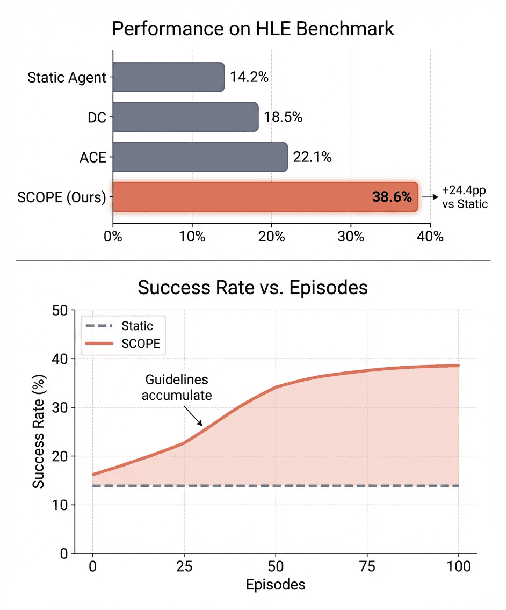
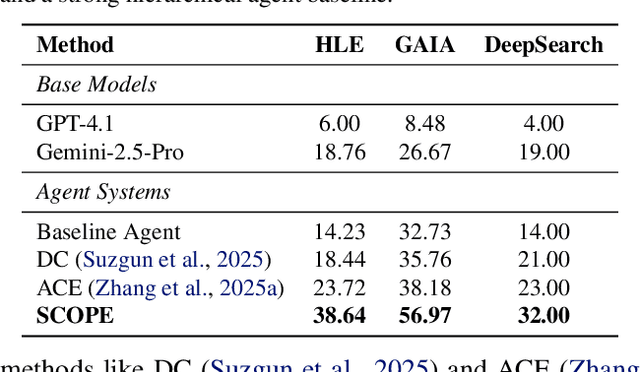
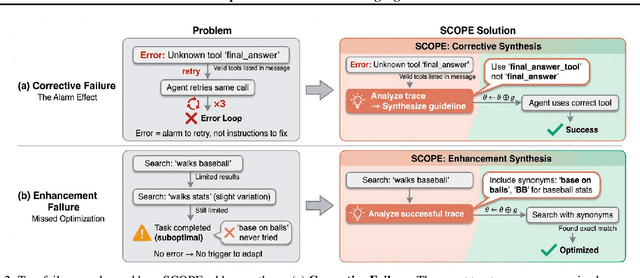
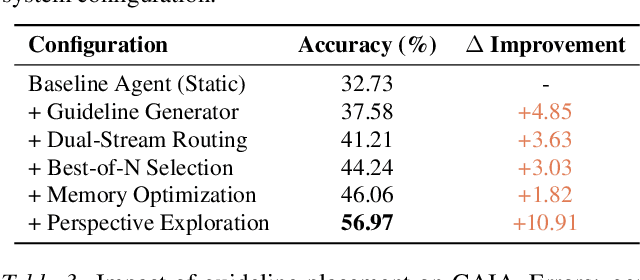
Abstract:Large Language Model (LLM) agents are increasingly deployed in environments that generate massive, dynamic contexts. However, a critical bottleneck remains: while agents have access to this context, their static prompts lack the mechanisms to manage it effectively, leading to recurring Corrective and Enhancement failures. To address this capability gap, we introduce \textbf{SCOPE} (Self-evolving Context Optimization via Prompt Evolution). SCOPE frames context management as an \textit{online optimization} problem, synthesizing guidelines from execution traces to automatically evolve the agent's prompt. We propose a Dual-Stream mechanism that balances tactical specificity (resolving immediate errors) with strategic generality (evolving long-term principles). Furthermore, we introduce Perspective-Driven Exploration to maximize strategy coverage, increasing the likelihood that the agent has the correct strategy for any given task. Experiments on the HLE benchmark show that SCOPE improves task success rates from 14.23\% to 38.64\% without human intervention. We make our code publicly available at https://github.com/JarvisPei/SCOPE.
MetaDefense: Defending Finetuning-based Jailbreak Attack Before and During Generation
Oct 09, 2025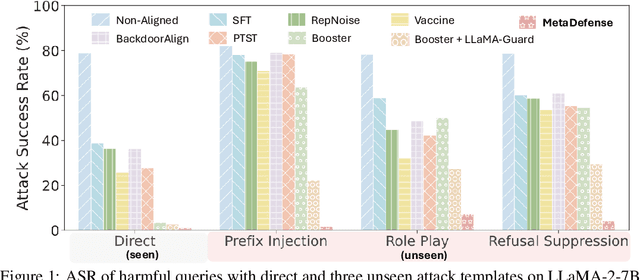

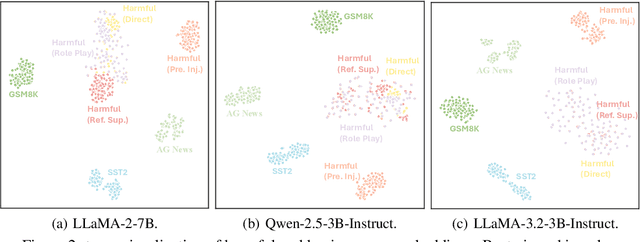
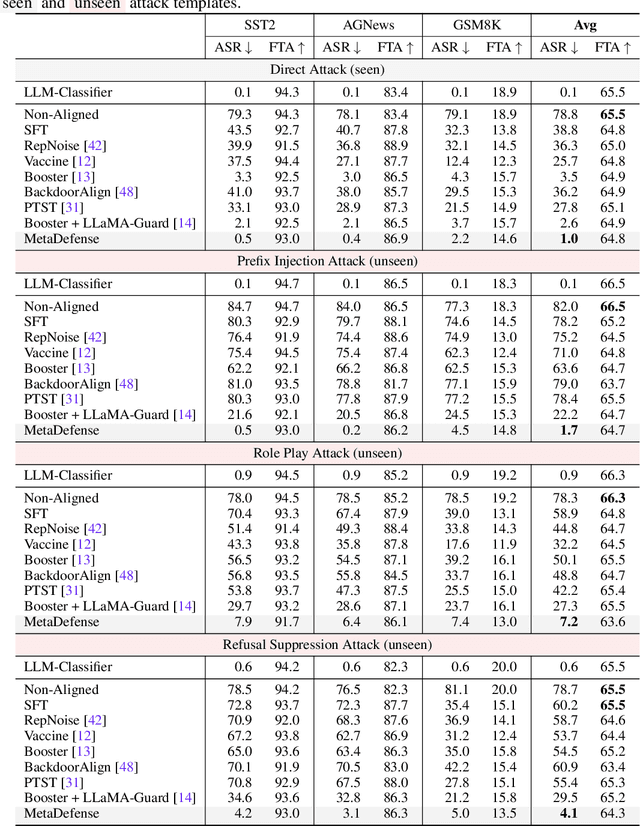
Abstract:This paper introduces MetaDefense, a novel framework for defending against finetuning-based jailbreak attacks in large language models (LLMs). We observe that existing defense mechanisms fail to generalize to harmful queries disguised by unseen attack templates, despite LLMs being capable of distinguishing disguised harmful queries in the embedding space. Based on these insights, we propose a two-stage defense approach: (i) pre-generation defense that detects harmful queries before response generation begins, and (ii) mid-generation defense that monitors partial responses during generation to prevent outputting more harmful content. Our MetaDefense trains the LLM to predict the harmfulness of both queries and partial responses using specialized prompts, enabling early termination of potentially harmful interactions. Extensive experiments across multiple LLM architectures (LLaMA-2-7B, Qwen-2.5-3B-Instruct, and LLaMA-3.2-3B-Instruct) demonstrate that MetaDefense significantly outperforms existing defense mechanisms, achieving robust defense against harmful queries with seen and unseen attack templates while maintaining competitive performance on benign tasks. Code is available at https://github.com/ws-jiang/MetaDefense.
PreMoe: Lightening MoEs on Constrained Memory by Expert Pruning and Retrieval
May 23, 2025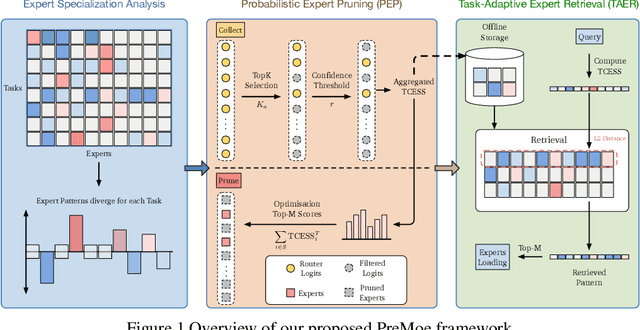

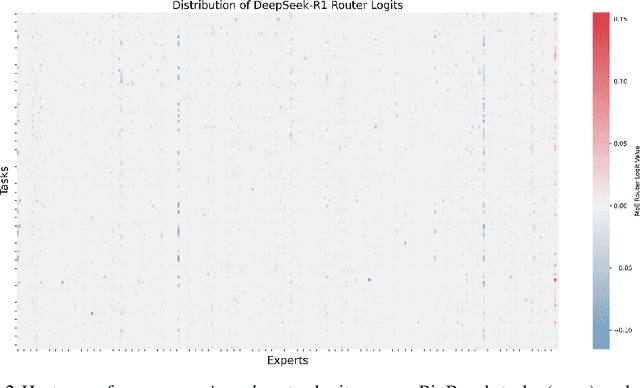
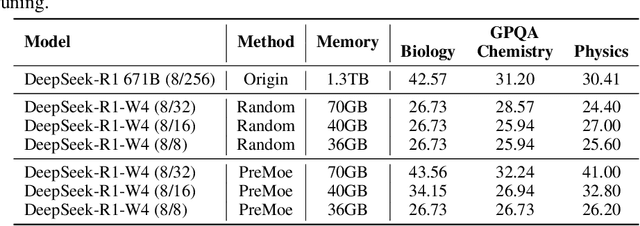
Abstract:Mixture-of-experts (MoE) architectures enable scaling large language models (LLMs) to vast parameter counts without a proportional rise in computational costs. However, the significant memory demands of large MoE models hinder their deployment across various computational environments, from cloud servers to consumer devices. This study first demonstrates pronounced task-specific specialization in expert activation patterns within MoE layers. Building on this, we introduce PreMoe, a novel framework that enables efficient deployment of massive MoE models in memory-constrained environments. PreMoe features two main components: probabilistic expert pruning (PEP) and task-adaptive expert retrieval (TAER). PEP employs a new metric, the task-conditioned expected selection score (TCESS), derived from router logits to quantify expert importance for specific tasks, thereby identifying a minimal set of critical experts. TAER leverages these task-specific expert importance profiles for efficient inference. It pre-computes and stores compact expert patterns for diverse tasks. When a user query is received, TAER rapidly identifies the most relevant stored task pattern and reconstructs the model by loading only the small subset of experts crucial for that task. This approach dramatically reduces the memory footprint across all deployment scenarios. DeepSeek-R1 671B maintains 97.2\% accuracy on MATH500 when pruned to 8/128 configuration (50\% expert reduction), and still achieves 72.0\% with aggressive 8/32 pruning (87.5\% expert reduction). Pangu-Ultra-MoE 718B achieves 97.15\% on MATH500 and 81.3\% on AIME24 with 8/128 pruning, while even more aggressive pruning to 4/64 (390GB memory) preserves 96.95\% accuracy on MATH500. We make our code publicly available at https://github.com/JarvisPei/PreMoe.
Reinforcing Compositional Retrieval: Retrieving Step-by-Step for Composing Informative Contexts
Apr 15, 2025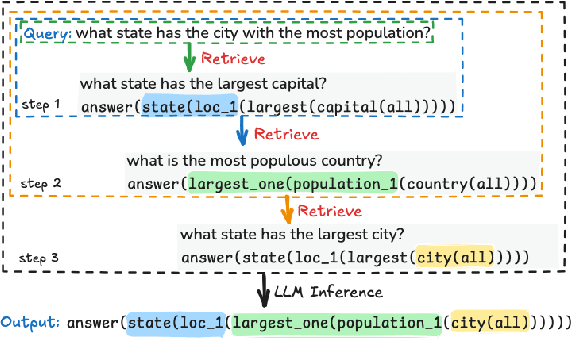
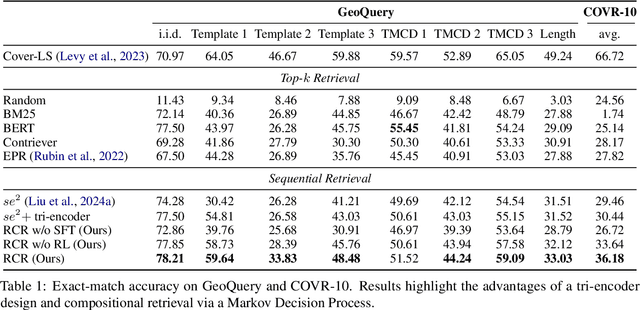
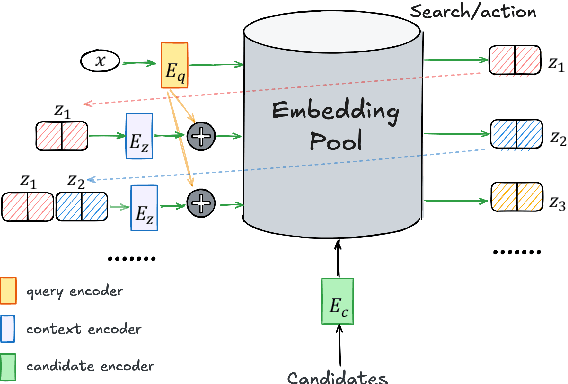
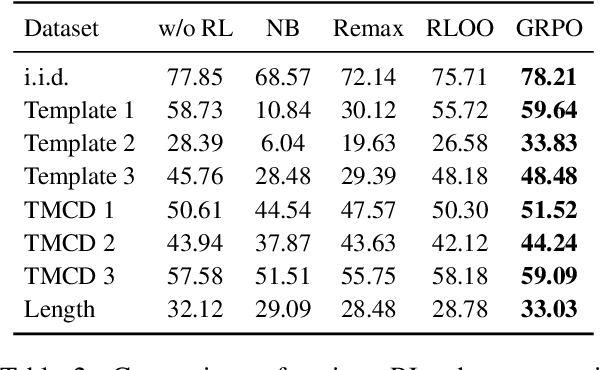
Abstract:Large Language Models (LLMs) have demonstrated remarkable capabilities across numerous tasks, yet they often rely on external context to handle complex tasks. While retrieval-augmented frameworks traditionally focus on selecting top-ranked documents in a single pass, many real-world scenarios demand compositional retrieval, where multiple sources must be combined in a coordinated manner. In this work, we propose a tri-encoder sequential retriever that models this process as a Markov Decision Process (MDP), decomposing the probability of retrieving a set of elements into a sequence of conditional probabilities and allowing each retrieval step to be conditioned on previously selected examples. We train the retriever in two stages: first, we efficiently construct supervised sequential data for initial policy training; we then refine the policy to align with the LLM's preferences using a reward grounded in the structural correspondence of generated programs. Experimental results show that our method consistently and significantly outperforms baselines, underscoring the importance of explicitly modeling inter-example dependencies. These findings highlight the potential of compositional retrieval for tasks requiring multiple pieces of evidence or examples.
KVTuner: Sensitivity-Aware Layer-wise Mixed Precision KV Cache Quantization for Efficient and Nearly Lossless LLM Inference
Feb 06, 2025



Abstract:KV cache quantization can improve Large Language Models (LLMs) inference throughput and latency in long contexts and large batch-size scenarios while preserving LLMs effectiveness. However, current methods have three unsolved issues: overlooking layer-wise sensitivity to KV cache quantization, high overhead of online fine-grained decision-making, and low flexibility to different LLMs and constraints. Therefore, we thoroughly analyze the inherent correlation of layer-wise transformer attention patterns to KV cache quantization errors and study why key cache is more important than value cache for quantization error reduction. We further propose a simple yet effective framework KVTuner to adaptively search for the optimal hardware-friendly layer-wise KV quantization precision pairs for coarse-grained KV cache with multi-objective optimization and directly utilize the offline searched configurations during online inference. To reduce the computational cost of offline calibration, we utilize the intra-layer KV precision pair pruning and inter-layer clustering to reduce the search space. Experimental results show that we can achieve nearly lossless 3.25-bit mixed precision KV cache quantization for LLMs like Llama-3.1-8B-Instruct and 4.0-bit for sensitive models like Qwen2.5-7B-Instruct on mathematical reasoning tasks. The maximum inference throughput can be improved by 38.3% compared with KV8 quantization over various context lengths.
CMoE: Fast Carving of Mixture-of-Experts for Efficient LLM Inference
Feb 06, 2025Abstract:Large language models (LLMs) achieve impressive performance by scaling model parameters, but this comes with significant inference overhead. Feed-forward networks (FFNs), which dominate LLM parameters, exhibit high activation sparsity in hidden neurons. To exploit this, researchers have proposed using a mixture-of-experts (MoE) architecture, where only a subset of parameters is activated. However, existing approaches often require extensive training data and resources, limiting their practicality. We propose CMoE (Carved MoE), a novel framework to efficiently carve MoE models from dense models. CMoE achieves remarkable performance through efficient expert grouping and lightweight adaptation. First, neurons are grouped into shared and routed experts based on activation rates. Next, we construct a routing mechanism without training from scratch, incorporating a differentiable routing process and load balancing. Using modest data, CMoE produces a well-designed, usable MoE from a 7B dense model within five minutes. With lightweight fine-tuning, it achieves high-performance recovery in under an hour. We make our code publicly available at https://github.com/JarvisPei/CMoE.
FuseGPT: Learnable Layers Fusion of Generative Pre-trained Transformers
Nov 21, 2024



Abstract:Generative Pre-trained Transformers (GPTs) have demonstrated remarkable performance across diverse domains through the extensive scaling of model parameters. Recent works observe the redundancy across the transformer blocks and develop compression methods by structured pruning of the unimportant blocks. However, such straightforward elimination will always provide irreversible performance degradation. In this paper, we propose FuseGPT, a novel methodology to recycle the pruned transformer blocks to further recover the model performance. Firstly we introduce a new importance detection metric, Macro Influence (MI), to detect the long-term influence of each transformer block by calculating their loss of information after removal. Then we propose group-level layers fusion, which adopts the parameters in layers of the unimportant blocks and injects them into the corresponding layers inside the neighboring blocks. The fusion is not one-off but through iterative parameter updates by lightweight group-level fine-tuning. Specifically, these injected parameters are frozen but weighted with learnable rank decomposition matrices to reduce the overhead during fine-tuning. Our approach not only works well on large language models but also on large multimodal models. The experiments have shown that, by using modest amounts of data, FuseGPT can outperform previous works in both perplexity and zero-shot task performance.
State Chrono Representation for Enhancing Generalization in Reinforcement Learning
Nov 09, 2024



Abstract:In reinforcement learning with image-based inputs, it is crucial to establish a robust and generalizable state representation. Recent advancements in metric learning, such as deep bisimulation metric approaches, have shown promising results in learning structured low-dimensional representation space from pixel observations, where the distance between states is measured based on task-relevant features. However, these approaches face challenges in demanding generalization tasks and scenarios with non-informative rewards. This is because they fail to capture sufficient long-term information in the learned representations. To address these challenges, we propose a novel State Chrono Representation (SCR) approach. SCR augments state metric-based representations by incorporating extensive temporal information into the update step of bisimulation metric learning. It learns state distances within a temporal framework that considers both future dynamics and cumulative rewards over current and long-term future states. Our learning strategy effectively incorporates future behavioral information into the representation space without introducing a significant number of additional parameters for modeling dynamics. Extensive experiments conducted in DeepMind Control and Meta-World environments demonstrate that SCR achieves better performance comparing to other recent metric-based methods in demanding generalization tasks. The codes of SCR are available in https://github.com/jianda-chen/SCR.
Improving the Generalization of Unseen Crowd Behaviors for Reinforcement Learning based Local Motion Planners
Oct 16, 2024



Abstract:Deploying a safe mobile robot policy in scenarios with human pedestrians is challenging due to their unpredictable movements. Current Reinforcement Learning-based motion planners rely on a single policy to simulate pedestrian movements and could suffer from the over-fitting issue. Alternatively, framing the collision avoidance problem as a multi-agent framework, where agents generate dynamic movements while learning to reach their goals, can lead to conflicts with human pedestrians due to their homogeneity. To tackle this problem, we introduce an efficient method that enhances agent diversity within a single policy by maximizing an information-theoretic objective. This diversity enriches each agent's experiences, improving its adaptability to unseen crowd behaviors. In assessing an agent's robustness against unseen crowds, we propose diverse scenarios inspired by pedestrian crowd behaviors. Our behavior-conditioned policies outperform existing works in these challenging scenes, reducing potential collisions without additional time or travel.
 Add to Chrome
Add to Chrome Add to Firefox
Add to Firefox Add to Edge
Add to Edge